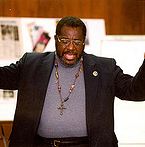By Colleen McFarland
In 1982 Robert Shuster, director of archives at the Billy Graham Center at Wheaton College, tackled the problem of documenting spiritual enthusiasm in the historical record.[1] Recognizing the importance of spiritual enthusiasm as an agent of social, cultural, and political change, Shuster asked whether archival documents can “capture” it — record spiritual awaking in ways that allow researchers to feel its spontaneity and its power.
Reflecting on his own repository, which collects historical documentation of Protestant nondenominational evangelism and mission work, he concluded that historical documents do not capture the Spirit: “Perhaps this cannot be done, or perhaps [archivists] have been too blinded by the collections of the archives of institutions to see what is needed for the shelves of repositories of experience.”[2]
On the one hand, I see Shuster’s point. Evanescent furvor of any kind, whether experienced at a revival meeting or a rock concert, simply does not carry over into the written description or video of the event. As we so often say when relating experiences to others, “You had to be there!”

Leading the Mennonite Board of Missions Board of Directors in a rousing version of ‘Holy Ground,’ John Powell lifts his hands in praise. Powell, who was currently serving as MBM’s interim director of evangelism and church development department, presented the board with a challenge to ‘get over’ obstacles facing them through the power of the Holy Spirit. Powell gave a morning devotional during the triannual board meetings, held October 23 to 25, 1997.
Archival Citation: Mennonite Board of Missions Photograph Collection. Indiana, Elkhart, Board of Directors Meeting, October 1997. IV-10-7.4 Box 7 Folder 22. Mennonite Church USA Archives – Goshen. Goshen, Indiana.
On the other hand, might Shuster have approached this question from an overly narrow understanding of the work of the Spirit? I have worked with researchers who developed deep emotional bonds with the people they “meet” only through archival records. I have seen researchers moved to acts of compassion by listening to voices of the dead; they have sought to bring injustice to light, to tell the stories of the long-forgotten, and to continue the work started long ago by an unknown other.
These relationships between the living and the dead never cease to amaze me. Are they spiritual friendships? Are they a manifestation of agape? I don’t know, but I see the Spirit at work in these relationships.
To return to Shuster’s article, I cannot help but think that he asked the wrong question. It is not a matter of whether the archival record can capture spiritual enthusiasm, but whether archivists and researchers alike can open themselves to receiving the work of the Spirit through the historical record.


